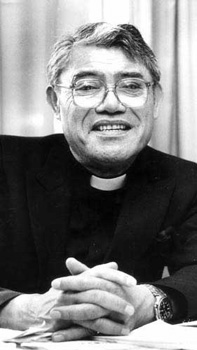 Kingi
Matutaera Ihaka was born at Te Kao, Northland,
in 1921. His great-grandfather, Paraone Ngaruhe,
signed the Treaty of Waitangi. Kingi's father
was a prominent Anglican, a qualified
interpreter, and a friend of Apirana Ngata.
Kingi
Matutaera Ihaka was born at Te Kao, Northland,
in 1921. His great-grandfather, Paraone Ngaruhe,
signed the Treaty of Waitangi. Kingi's father
was a prominent Anglican, a qualified
interpreter, and a friend of Apirana Ngata.
Kingi attended Te Kao Native School. In later
life he recalled that as a child he saw few
Pakeha other than his teacher and the district
health nurse.
In 1936 Kingi went to St Stephen's School, south
of Auckland. In 1947 he entered St John's
College, Auckland, to train for the Anglican
ministry. In 1958 he was transferred to
Wellington. He combined his ministry with the
Red Cross, broadcasting and tutoring at Ngati
Poneke Maori Club. He became well known for his
compositions and direction of Maori cultural
groups at competitions.
In 1967 Ihaka was transferred to Auckland as
Auckland Maori missioner. His other interests
continued unabated and he was also involved with
the Auckland Festival Society, Lions Club,
Tourist Development Council, Polynesian Festival
Committee. In 1970 he was appointed a justice of
the peace and made an MBE. In 1981 he wrote Pukeko
in a Punga Tree.
From 1984 to 1987 Archdeacon Ihaka served as the
first resident Maori minister in Sydney.
Kingi Ihaka returned to New Zealand in 1987. He
was knighted in 1989 for his services to the
Maori people.
In October 1990 he became the second Maori
language commissioner. He defended the right of
the New Zealand women's rugby team to perform a
haka at Cardiff, saying that Ngati Porou and
Waikato women had done so for many years. He
died in 1993, aged 71.
Full
essay in DNZB